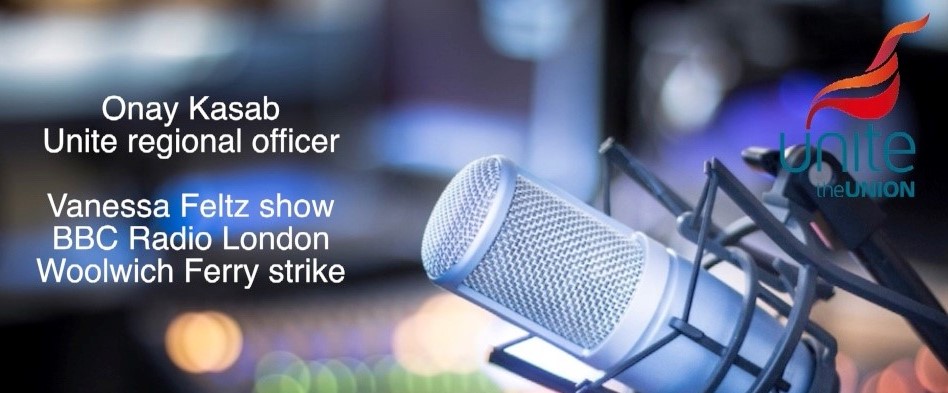Ferry strikes go on
Travellers using the Woolwich Ferry face two-days of disruption later this month, as new strikes are announced in the long-running dispute over a bullying culture, and health and safety issues.
Unite said today (April 6) that talks had stalled because an intransigent management had failed to make sufficient progress into a number of serious allegations, including a case of sexual harassment.
The union has told Briggs Marine Contractors Ltd, which runs the service on behalf of Transport for London (TfL), that its members will strike for 24 hours from just after midnight on Tuesday, April 18 and Friday, April 21.
Workers, belonging to Unite and the GMB, took two days of strike action – January 27 and February 3 – before suspending industrial action so that talks could take place.
Unite regional officer Onay Kasab said that “talks have not made enough progress.”
“The top managers are intransigent, evasive and prone to stalling.
“The investigation into the sexual harassment case is still ongoing, as is the probe into sending workers to work in exhaust fume filled areas,” he said. “And to top it all, no managers have been held to account for their actions.”
â€Serious allegations’
“The union has also made serious allegations about the way some managers have conducted themselves in the workplace in a number of respects – and we firmly believe these matters warrant further investigation,” he added.
“These allegations have been brought up as part of the dispute negotiations to demonstrate very clearly that a management problem exists – but the company has simply stated that it will re-issue guidance to all staff in these areas instead of taking decisive action.
As UNITElive reported on the ferry workers’ first day of strike action on January 27, a major issue in the dispute is health and safety.
The ferry workers have warned that operator Briggs Marine bosses have failed to properly maintain the boats. Fire-fighting equipment isn’t sufficient and workers have found toxic E.coli bacteria in vessel water tanks.
And only the day after the first strike day, an ambulance was called to the ferry after the engineer, a Unite member, collapsed from inhaling fumes in the engine room of one of the boats.
The incident, Kasab said at the time, “underlines what Unite has been saying – that there are serious health and safety concerns relating to the ferry.”
Now, workers poisoned by the fumes face sickness absence hearings. This is an outcome which could include disciplinary warnings for sickness absence, which, Kasab said would be “grossly unfair, given the circumstances.”
But perhaps most disturbing of all, management have continued to turn a blind eye to a staff member who’s allegedly been sexually harassed for years.
Unite member Colleen* who has been working for the ferry service for nearly 24 years, told UNITElive it all started with what at first glance might appear as an innocent comment here and there from a person in management. But then he persisted.
â€Frightened’
“It made me seriously uncomfortable – it frightened me,” she explained.
Although she had told him repeatedly his advances were not welcome, they’ve continued for years, and like so many women who are harassed by their superiors in the workplace, she’s suffered in silence out of fear.
“It was so hard because all these people are above me. But it got to the point where it was seriously making me ill,” she said. “So I finally decided to speak out.”
Thanks to Colleen’s bravery and the support of Unite reps and her colleagues, she put in a detailed grievance, but management has so far failed to address the issue.
And so the dispute continues.
“We have worked very hard to reach a settlement on the myriad issues stemming from this dispute, so travellers would not face disruption,” Kasab noted. “But the management’s negative attitude has left us with no alternative.”
About 3,500 vehicles a day use the free service across the Thames which opened in 1889, following the abolition of tolls across bridges to the west of London. An estimated 2m passengers also use the ferry annually.
There has been a ferry has been in place at the site since the 14th century.
Find out more about why Unite ferry workers are going on strike in the video below:
 Like
Like Follow
Follow
